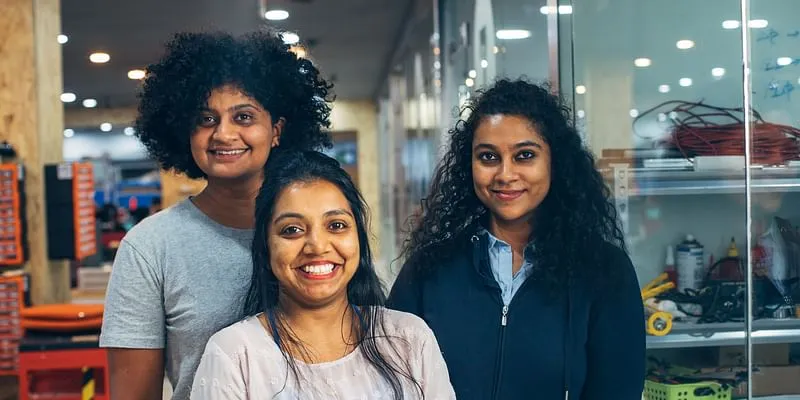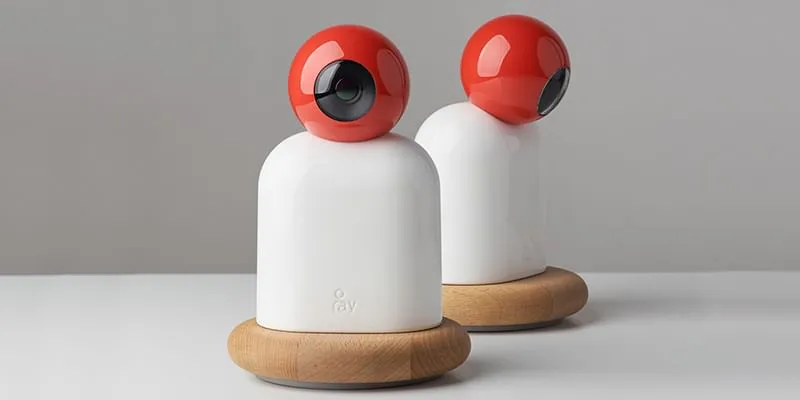Coronavirus: These women engineers' mini ICU system will help doctors monitor patients remotely
Healthtech startup RIoT Solutions, which builds respiratory monitoring systems, launched a plug-and-play mini ICU system to monitor coronavirus patients.
Since 2016 three women engineers – Ranjana Nair, Aardra Kannan Ambili, and Sanchi Poovaya – have been working on solutions that track our breathing.
They were looking to build AI-powered healthcare systems, which led them to start RIoT Solutions. The startup leverages Artificial Intelligence (AI) to build highly accurate respiration monitoring systems.
One of its first products, Raybaby is possibly the first non-contact sleep and breathing monitor for babies. The device won several awards at CES and ABC Kids Expo. Now, the trio has built a non-contact, Wi-Fi enabled, affordable respiration rate monitor (for coronavirus patients) that can run as mini ICU units. It is called RayIoT.
“Covid-19 is a highly contagious virus strain that aggressively attacks the respiratory tract. It is clear that a remote vital tracking system is the need of the hour,” says Ranjana.
A reusable, plug-and-play solution, the RayIoT needs no training to be used, and is priced at Rs 19,999. You can also rent it at Rs 300 per unit per day.
The units are available for use immediately, and pre-orders for the first batch are open.

The founders - Ranjana Nair, Aardra Kannan Ambili, and Sanchi Poovaya
How does it work?
In its current form, RayIoT will work as a mini ICU monitoring unit. The AI algorithms will allow doctors and other health professionals to track multiple patients’ respiration rate via an app from anywhere in the world.
The device simply needs to be set up at a distance of three feet from a patient after which it will proceed to accurately track their breathing rate and send the data to the app. The app will give notifications of drastic fluctuations in breathing rate.
Caregivers can use this as an indication to establish what steps should be taken next with respect to the treatment of a patient. In addition to the respiration sensing module, RayIoT is also capable of audio and video streaming. This will be useful in monitoring critically ill patients.
“We can track up to five lakh patients at any given point in time. In India, 50 percent of the infected population can be effectively monitored with 10,000 devices,” says Ranjana.
RayIoT can also be used to effectively monitor patients in home quarantine to provide early indicators of symptoms. For every patient who is coronavirus positive, the startup plans to rent RayIoT to monitor their health for the prescribed quarantine of 14 days.
At the moment, there are 5,000 deployable devices available that can cover 25 percent of the infected population over this period. With 10,000 units, 50 percent of the infected population can be effectively monitored.
“Built on a technology that has undergone over 500 hours of clinical trials and seven million breathing instances during fever, asthma, and sleep apnoea, RayIoT is the perfect fit for the gap in the system. RayIoT has been closely working with the doctors at HCG hospital to enhance the usability and relevance,” says Ranjana.
Speaking of how the product helps, Anjali Ajai Kumar Director, HCG Cancer Specialist Hospital Foundation, says, “We have been working closely with the RayIoT team to test their AI-powered monitors in our ICU wards. Their non-contact respiration rate monitor is the need of the hour during these CoVid times”

The RayBaby
What does it solve?
While monitoring the coronavirus pandemic and its impact, the startup realised there were three main problems:
Excessive inflow of patients: Not having enough resources for the estimated affected population: caregivers, hospital beds or ventilators and importance of preventive action in the wake of no vaccine. (There is a shortage of 6,00,000 doctors and two million nurses). Intelligently categorising quarantined patients as mild, severe, and critical is important to make sure the right patient gets access to doctors and ICU facilities.
Management of patients in quarantine: The Karnataka state government is asking patients to take and send selfies every hour to track their health while the Delhi government is tracking them using GPS locations of mobile phones. These methods are not scalable and sustainable. And, random places are being converted into quarantine facilities that do not have a clinical setting. Due to a large number of patients, the government is unable to provide proper care to people who are in critical need.
Doctors falling ill: Doctors are also in danger because they are in hotspots and cannot avoid contact.
Ranjana adds that there are four vitals that get tracked in an ICU unit when you are monitoring a coronavirus patient – respiration rate, heart rate, blood pressure, and temperature.
The startup’s RayIoT can help monitor all these aspects and more. The device’s raytech tracks respiration rate without putting anything on the body from a distance. So, any space can be converted into a clinical setting using affordable, non-contact raytech.
Since all the devices can be connected to one central database, using RayIoT, healthcare professionals can monitor more than one lakh patients at a time continuously. By just tracking respiration rate, they will be able to intelligently categorise quarantined patients into mild, severe, and critical cases.
Last but not least, the device’s audio/video feature will help a doctor can see and hear patients categorised as critical or severe. This will also help in selecting patients who need immediate care, and direct resources to the right patient. Additionally, doctors remain safer as they avoid contact with the patients.
“This also helps doctors to select the patient, who needs care and direct the resources to the right patient. Doctors remain safer as they avoid contact with the patients. With our technology, we can thereby help manage this pandemic intelligently by bridging the gap from uneven distribution of resources to the affected,” adds Ranjana.
The team and ideation
The idea of RIoT came to the trio when a celebrity who was converting his 14-room sprawling bungalow into a quarantine facility reached out to them. He needed access to doctors, nurses, and medical equipment to fully equip his quarantine facility.
“We had to come up with a low-cost solution that could monitor the vitals of hundreds of patients at any given point of time and connect to doctors through video when the patients are moving into severe or critical stage. The solution also had to support the government taskforce monitoring the population by providing them a quarantine database,” says Ranjana.
RayIoT is supported by SOSV, Anthill Ventures, Madison Ventures, and HCG Hospitals. The startup has a 20-member team. It has previously raised $1.5 million in 2018 and is in the middle of raising the next round.
“As a company, we have hit 300 percent YoY growth from 2018 when we launched our other products. We have attained an ARR of $750,000 in less than a year of launching the product. We have acquired more than 3,000 customers in the past 12 months,” says Ranjana.
There are several healthtech startups tirelessly working to provide different healthcare solutions to curb the spread of the novel coronavirus. Established players like Thyrocare and Practo are already working on tests as well.
"Our products are charged between Rs 15,000 and Rs 19,000. We are the only vital tracker that lets the doctor check the patient's vital from anywhere in the world,” says Ranjana.
Edited by Saheli Sen Gupta










